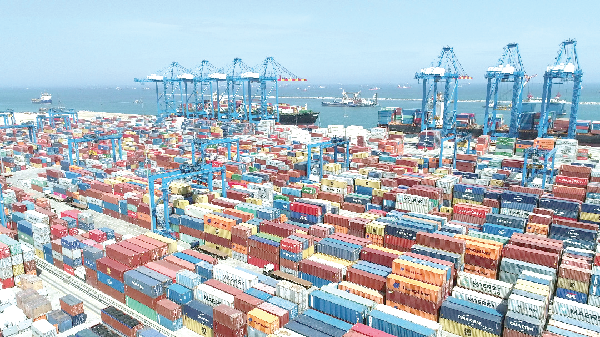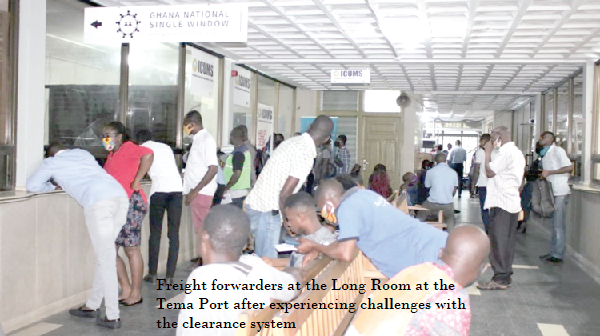
A closer look at Benchmark Discount Policy and its impact on port trade
Related incidence of malfeasance, pilfering, documentation fraud, smuggling of goods, undervaluation (imports mispricing), and misdescription in an attempt to evade payment of appropriate import taxes are not new as far as port trade is concerned.
These incidents have over the years prompted successive governments to take a number of remedial actions including the introduction of policies and programmes aimed at ensuring revenue assurance, protection and overall efficiency throughout the port system.
Advertisement
Over the past 20 years, reforms ranging from the introduction of customs management systems, paperless regimes seeking to take out the manual processes in cargo clearance, and recently the benchmark discount policy among others have all been introduced and implemented with varying degrees of success, effectiveness and support from the port authorities.
Benchmark Discount
In April 2019 however, the benchmark values were discounted following persistent complaints from the importing public and industry on increased cost of assessed taxes which are frequently determined using assessed duties and taxes.
These taxes are time and again fixed using the foreign convertible currencies and converted into the local currency applying the prevailing exchange rates.
Benchmark values are a risk mechanism that have been put in place by the Customs Division of the Ghana Revenue Authority (GRA) as an internal control system to leverage the valuation of selected commodities, and basically traded commodities on the international markets.
These commodities are often prone to the ills of mispricing.
The government, in a policy statement, decided to apply some level of discounts to the assessed customs value on goods and also the determined Home Delivery Value (HDV) on vehicles to mitigate the complaints of high duties and taxes paid at the ports.
The decision was also intended to attract more cargo import into the country, particularly at a time when the new cargo handling terminal developed by the Meridian Port Services (MPS) had opened for business.
In addition, the move was to ensure a reduction in the incidence of smuggling where some importers were alleged to have been increasingly using neighbouring ports to import cargos, which were subsequently smuggled through unapproved borders into the various markets across the country.
The measure also sought to reduce fraud by way of under-invoicing, which consisted of changing the transactional values on imports by allegedly reproducing an entirely new invoice locally to cover imports as well as describing imports as products that attract lower customs rate by way of alleged misdescription.
While these activities are already criminalised as customs offences for which persons caught are sometimes penalised by slapping them with a 300 per cent penalty units on the reassessed value, the practice has shown that overreliance on the deterrent effect of criminalisation would only amount to trying to close the stable door after the horse has long bolted.
For these reasons, the discount regime thus came in handy by offering 50 per cent reduction in the accessed Free on Board (FOB) values for general goods imports and 30 per cent reduction on HDV for vehicles creating what was expected to ensure a reduction in prices for consumers of general imports in particular.

It is worth noting that the Benchmark discount is not practiced anywhere in the world, including among Member States of the World Trade Organisation (WTO), as well as those that have signed to and ratified the agreement on the Implementation of the Article on the General Agreement on Tariffs and Trade 1994 - the current valuation system that guides the determination of customs values for the clearance of imports.
Goals
However, two years on, after the adoption of the policy, there have been concerns as to whether the policy has achieved the goals for which it was introduced.
This is because, prices of goods in the markets were said to have remained the same with intermittent increases although importers enjoyed the discount by way of payment of duties and taxes being halved on nearly 100 commodities that were listed under the policy including products already enjoying government reliefs and concessions.
Consumers have over time complained about the prices of goods arguing that the policy has rather benefitted the importers and traders to the disadvantage of the consumer.
The importers and trading associations on the other hand, have maintained that their prices are as a result of other elements such as transport and rising foreign exchange rates which increase the cost of doing business.
Concerns have also been raised about the genuineness of invoices covering imports of which information gathered at the Customs Division of the GRA, suggest that about 80 to 85 per cent of invoices received daily on imports are often not genuine.
1DIF
Others have also argued that the discount policy itself is a slap in the face of the government’s One District, One Factory (DIF) policy introduced in 2017 with the aim of ensuring import substitution and further drive the country’s industrialisation agenda.
The 1D1F concept had a goal to ensure that the country’s manufacturing base would become an export contributor to the Gross Domestic Product (GDP), reduce reliance on imports and guarantee some level of production capacity for each district in the country thereby impacting employment positively.
Industry players believe that under the programme, many new factories are not emerging.
Rather, some existing establishments applied to be listed on the programme with some efforts also being made to revive some defunct factories from the past.

Arguably, the failure of the 1D1F initiative to take off properly might have thus justified the benchmark discount sustenance since one could fairly say that the government may not have been adequately committed to its own policy of a district industrialisation.
Agitations
Even before a recent announcement by the Finance Minister of government’s decision to reverse the policy as contained in the 2022 budget statement presented to Parliament, the trade associations and the manufacturing sector led by the Association of Ghana Industries (AGI) have been at each other’s neck on a possible reversal of the policy.
They have warned of possible rise in prices on the market should they be made to pay the full cost and what they described as a possible collapse of businesses which could also impact negatively on employment in the sector.

Could we say that the agitations by the trading associations made up of the Ghana Union of Trading Associations (GUTA), Consultative Business Forum of Importers and Agents are justified in the wake of seeming lack of direction on the industrialisation programme?
Are there any justifications using the steep increase in global freight rates on imports which are likely to continue in the coming months, according to the United Nations Conference on Trade and Development (UNCTAD) as well as associated elements of various taxes militating against trade locally?
So far, it is unclear which sufficient mitigatory structures have been put in place to guard against concerns over a possible rise in the smuggling, malfeasance, pilfering, documentation fraud, undervaluation (imports mispricing) and misdescription incidents that informed the introduction of the policy in the first place.




